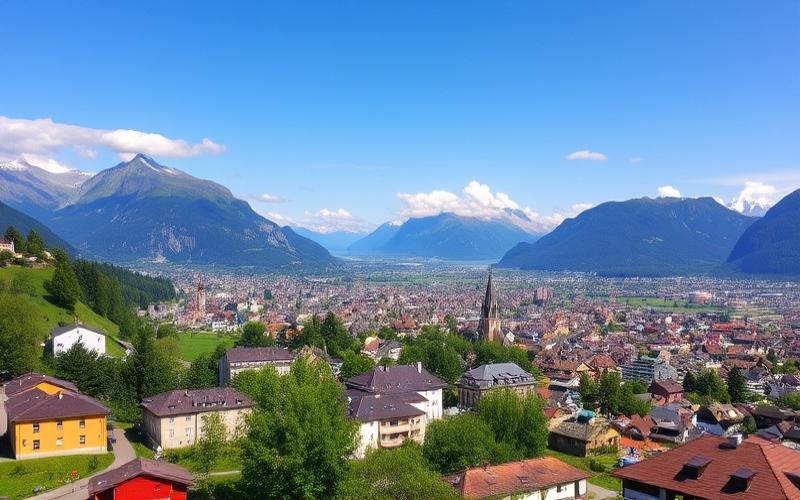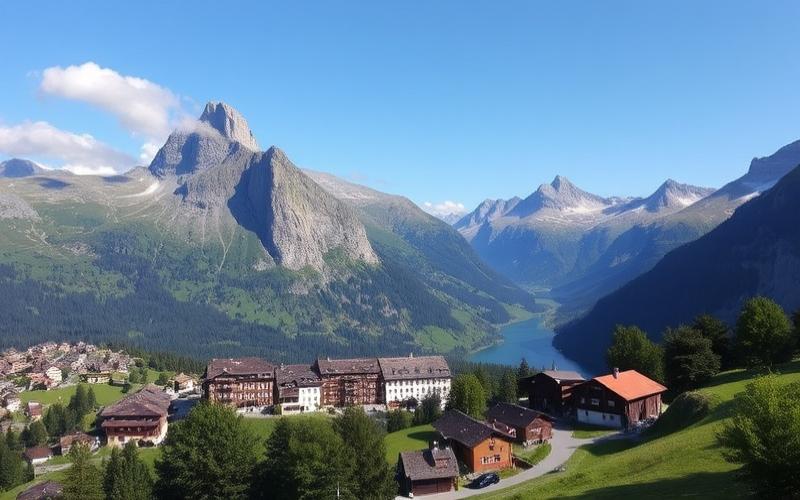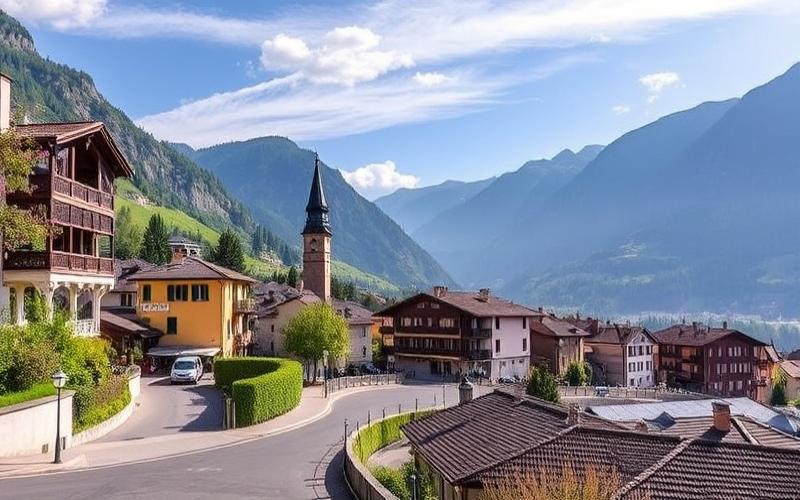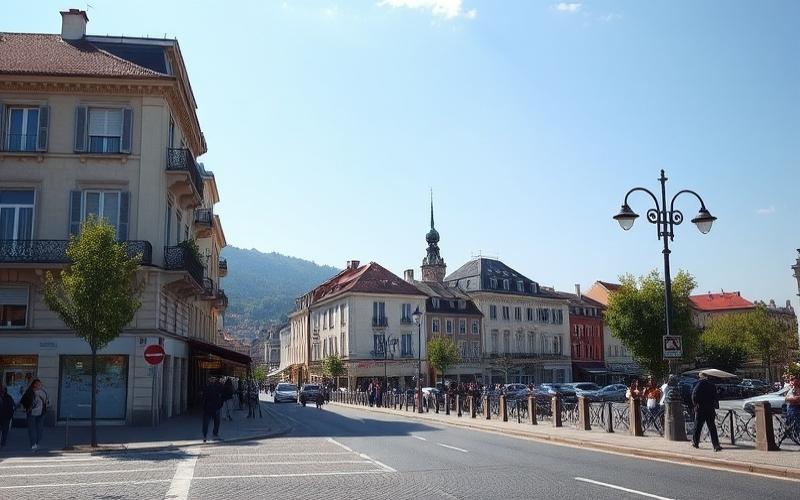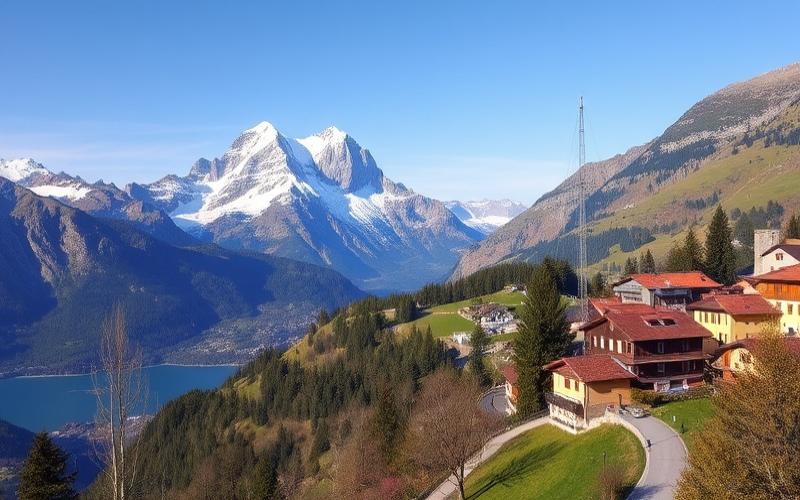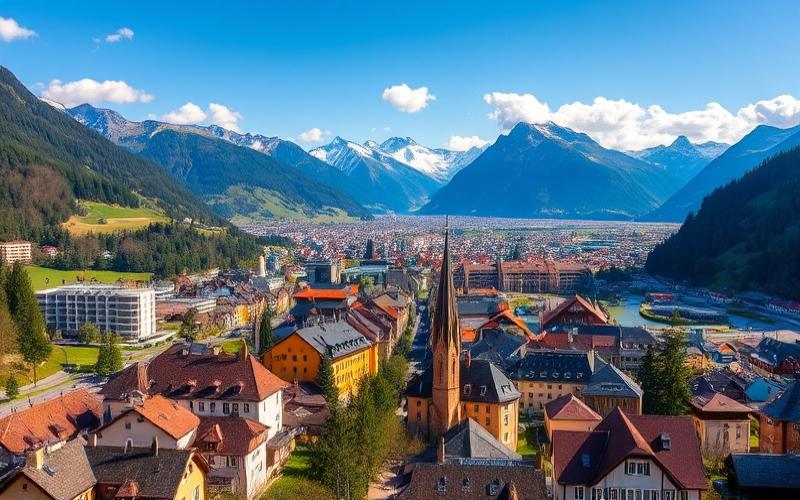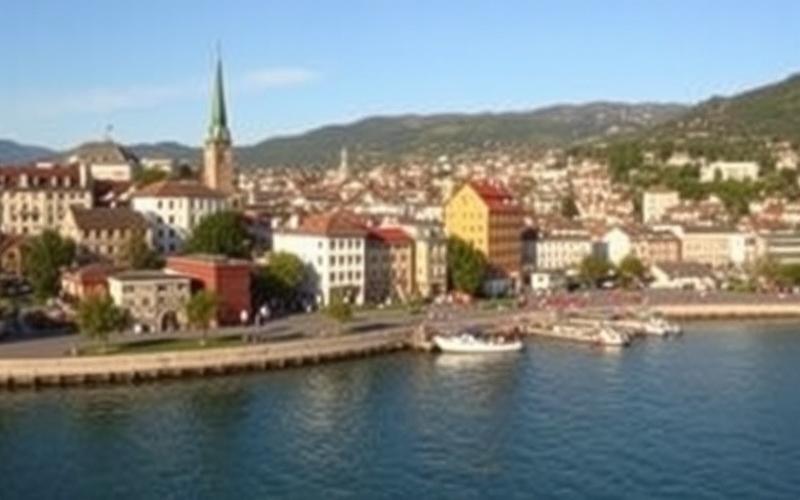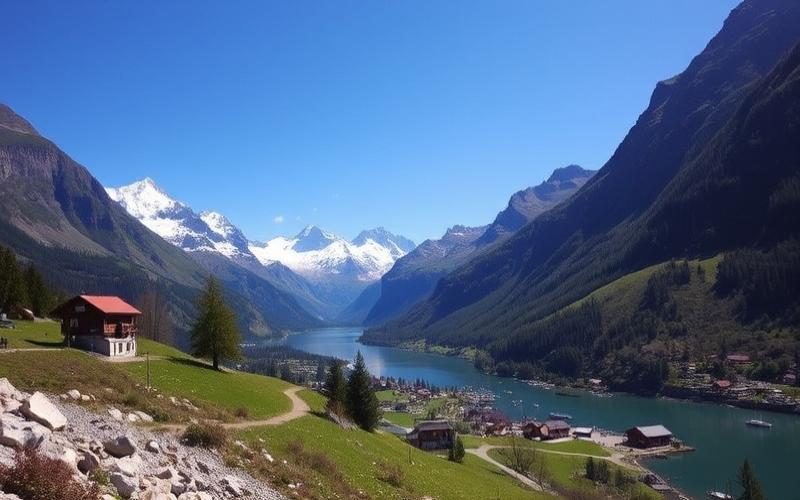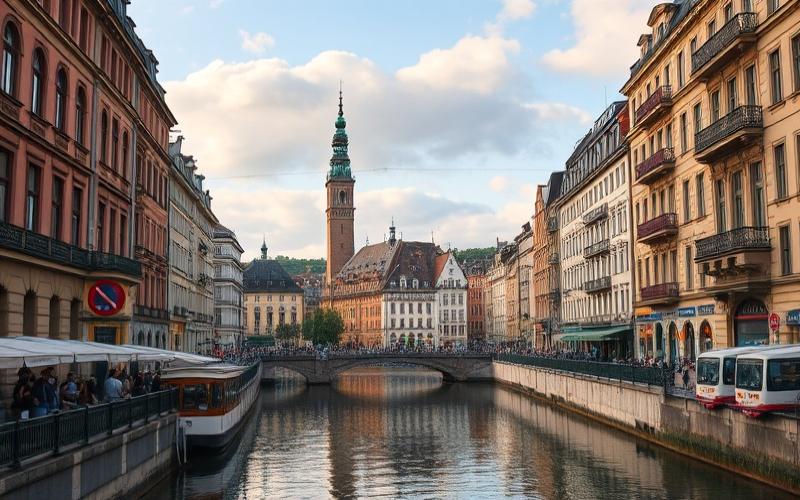
 Published on and written by Cyril Jarnias
Published on and written by Cyril Jarnias
Switzerland, renowned for its stability and quality of life, is poised to undergo a major urban transformation in the coming years. Ambitious new projects are emerging across the country, promising to redefine the contours of Swiss cities and offer unprecedented opportunities in the real estate market. These developments, combining innovation, sustainability, and responses to growing housing needs, are part of a long-term vision for Swiss territorial development.
As demographic pressures and environmental challenges push authorities and private stakeholders to rethink urban planning, Switzerland is positioning itself as a laboratory of ideas for the city of tomorrow. From smart neighborhoods to industrial site rehabilitation, and large-scale infrastructure projects, the Alpine country is decisively entering a new era of urban development.
These projects are not only responses to current challenges; they also represent significant opportunities for savvy investors. In a traditionally stable and attractive real estate market, these new initiatives promise to generate value while helping to shape the future of Swiss cities.
Future Construction Sites: Urban Projects Reshaping Switzerland
Switzerland is embarking on a wave of innovative urban projects that promise to profoundly transform its real estate landscape. These initiatives, spread across the entire territory, reflect a shared commitment to creating modern, sustainable living spaces adapted to the needs of an evolving population.
In Winterthur, the city is investing in six Smart City projects for 2025, perfectly illustrating this trend. These projects, funded at 200,000 francs per year, aim to enhance sustainability, digital innovation, and urban quality of life. Among the most notable initiatives are:
- The “Sponge City in Action” project, which tests the use of green roofs and permeable surfaces to cool the city and better manage stormwater.
- “Winti Re-Use,” an innovative platform for reusing construction materials, promoting a circular economy in the building sector.
- “CulturAI,” an artificial intelligence-based system to promote local cultural events, thereby strengthening the urban social fabric.
These projects are part of the “Smart City Winterthur 2030” strategy, adopted by the city council, which aims to promote innovation and develop the city’s digital transformation.
Meanwhile, Geneva stands out with bold initiatives in urban mobility. The canton has been studying the feasibility of transporting patients via taxi drones since 2019, an unprecedented project that could launch as early as 2025. This innovation is part of the Urban Air Mobility (UAM) Initiative by the European Innovation Partnership on Smart Cities and Communities (EIP-SCC), illustrating Switzerland’s ambition to position itself at the forefront of future mobility solutions.
The rehabilitation of industrial sites and the transformation of vacant offices represent another major focus of Swiss urban development. According to a recent report, regenerating a portion of these spaces could create 15 to 20 million housing units and mixed-use spaces in Europe, requiring investments of around 4 trillion euros over the next 10 to 15 years. Switzerland, with its tradition of excellence in territorial planning, is well-positioned to capitalize on this trend.
These urban regeneration projects offer a unique opportunity to rethink urban planning by integrating principles of sustainability and functional diversity. They not only address housing shortages in urban centers but also create vibrant and attractive neighborhoods that align with Swiss citizens’ aspirations for more livable and eco-friendly living spaces.
Good to Know:
Switzerland is embarking on a major urban transformation with innovative projects like Smart Cities in Winterthur, taxi drones in Geneva, and industrial site regeneration. These initiatives aim to create sustainable living spaces adapted to future needs, offering significant opportunities for real estate development and investment.
The Swiss Real Estate Market in Transition: Impacts and Outlook
The emergence of these new urban projects has significant repercussions on the Swiss real estate market, already known for its stability and attractiveness. Current trends reveal a complex dynamic, where price pressure in urban centers coexists with new opportunities in developing areas.
The Swiss real estate market is experiencing contrasting evolution between urban and rural areas. In major cities like Zurich, Geneva, and Basel, demand remains strong, leading to continuous price increases. This trend is explained by the persistent appeal of urban centers, offering proximity to jobs and access to services. Urban development projects, by creating new attractive living spaces, contribute to maintaining this price pressure in central areas.
However, new urban development projects, particularly those focused on industrial site regeneration and the creation of smart neighborhoods, open new perspectives. They increase housing supply in previously underutilized areas, which could eventually contribute to price stabilization in certain market segments.
Projections for 2025 indicate a 5.7% increase in construction volume, driven by rising investments in new projects and the gradual reduction of existing obstacles. This positive dynamic should partially address the housing shortage observed in some regions while stimulating economic activity in the construction sector.
The impact of these developments on the real estate market is also evident through the evolution of sought-after property types. There is growing demand for homes incorporating the latest innovations in home automation and energy efficiency. Smart City projects, like those in Winterthur, set new standards for urban quality of life, influencing buyer and tenant expectations.
Furthermore, the conversion of vacant offices into residential or mixed-use spaces, encouraged by new urban policies, could revitalize certain neighborhoods and create new investment opportunities. This trend is part of a broader reflection on the flexibility of urban spaces and their ability to adapt to evolving lifestyles and work patterns.
The Swiss real estate market also faces challenges, particularly regarding housing accessibility. The continuous rise in prices in urban centers raises questions about housing affordability for part of the population. New urban development projects will therefore need to strike a balance between attractiveness, innovation, and accessibility to meet the diverse needs of the Swiss population.
Good to Know:
The Swiss real estate market is experiencing contrasting evolution, with rising prices in urban centers and new opportunities in developing areas. Innovative urban projects influence buyer expectations and set new standards for quality of life, while raising questions about housing accessibility.
Investing in the Future: Opportunities to Seize in Swiss Real Estate
The transforming Swiss real estate landscape offers unique opportunities for savvy investors. Urban development projects, combining innovation and sustainability, create fertile ground for investments with high growth potential and positive impact.
One of the most promising sectors is urban regeneration. The transformation of industrial sites and vacant offices into residential or mixed-use spaces represents an investment opportunity estimated at 4 trillion euros in Europe over the next 10 to 15 years. In Switzerland, these projects benefit from political support and growing demand for modern, sustainable living spaces in urban centers.
To leverage these opportunities, investors must adopt a strategic approach:
- Identify strategic locations and reliable development partners to build a pipeline of high-potential projects.
- Strengthen due diligence to thoroughly understand the specific risk and success factors of urban regeneration projects.
- Prioritize projects that emphasize quality urban programming, developed in close collaboration with local stakeholders, to generate lasting economic, social, and environmental value.
Smart City projects, like those developed in Winterthur, also offer interesting prospects for investors. These initiatives, which integrate advanced technologies to improve urban quality of life, create new investment niches in areas such as energy efficiency, sustainable mobility, and smart urban services.
The sustainable construction sector represents another promising investment axis. With a projected 5.7% increase in construction volume for 2025, opportunities are plentiful for investors looking to engage in innovative and environmentally friendly real estate projects. The growing demand for homes incorporating the latest advances in home automation and energy efficiency paves the way for investments in next-generation properties.
Investors should also pay attention to rental market developments. The housing shortage in certain urban areas, combined with the creation of new attractive neighborhoods, can offer interesting opportunities for rental investment. Urban development projects that integrate functional diversity (housing, commerce, workspaces) are particularly promising, as they meet new expectations for urban quality of life.
Finally, the innovative urban mobility sector, illustrated by projects like taxi drones in Geneva, opens new perspectives for visionary investors. Although these projects are still in their early stages, they represent significant long-term growth potential and could have a major impact on real estate valuation in certain areas.
To maximize success chances, investors must adopt a long-term vision and be ready to engage in projects that combine financial profitability and positive impact on urban development. Collaboration with local stakeholders and a deep understanding of Swiss market specifics are essential to identify and seize the best opportunities.
Good to Know:
Investment opportunities in Swiss real estate are numerous, ranging from urban regeneration to Smart City projects and sustainable construction. Investors should adopt a strategic approach, prioritizing projects with high growth potential and positive impact, while remaining attentive to local market specifics.
Conclusion: A Promising Future for Swiss Real Estate
The Swiss real estate landscape is on the brink of a major transformation, driven by innovative and ambitious urban development projects. These initiatives, whether Smart Cities, urban regeneration, or new mobility solutions, promise to redefine the contours of Swiss cities and offer new opportunities for investors and residents.
Switzerland, true to its reputation for excellence and innovation, is positioning itself as a laboratory for the city of tomorrow. Current and upcoming projects demonstrate a strong commitment to creating sustainable, intelligent urban spaces adapted to the evolving needs of the population. This dynamic paves the way for a more diverse and resilient real estate market, capable of meeting the challenges of the 21st century.
For investors, these developments represent a unique opportunity to participate in building Switzerland’s urban future. By adopting a strategic approach and engaging in high-impact projects, they can not only generate attractive returns but also positively contribute to the sustainable development of Swiss cities.
The future of Swiss real estate therefore looks promising, combining traditional stability with bold innovation. In this dynamic context, the ability to anticipate trends and adapt to new market realities will be crucial to seize the best opportunities and participate in building a sustainable and prosperous urban future in Switzerland.
Disclaimer: The information provided on this website is for informational purposes only and does not constitute financial, legal, or professional advice. We encourage you to consult qualified experts before making any investment, real estate, or expatriation decisions. Although we strive to maintain up-to-date and accurate information, we do not guarantee the completeness, accuracy, or timeliness of the proposed content. As investment and expatriation involve risks, we disclaim any liability for potential losses or damages arising from the use of this site. Your use of this site confirms your acceptance of these terms and your understanding of the associated risks.












